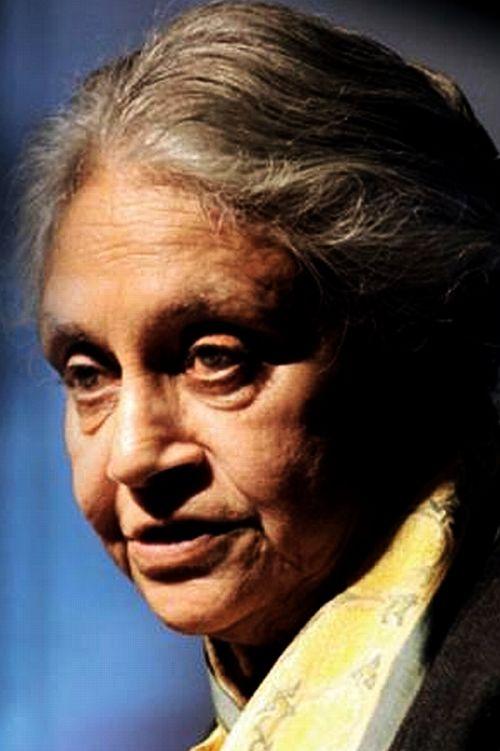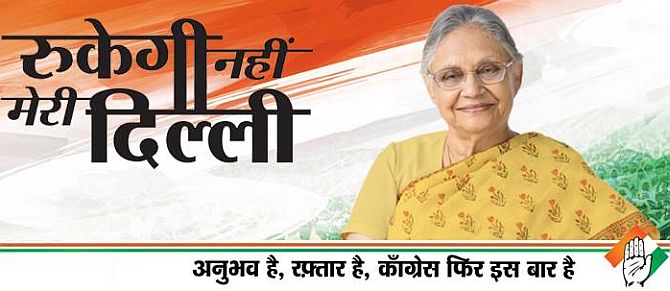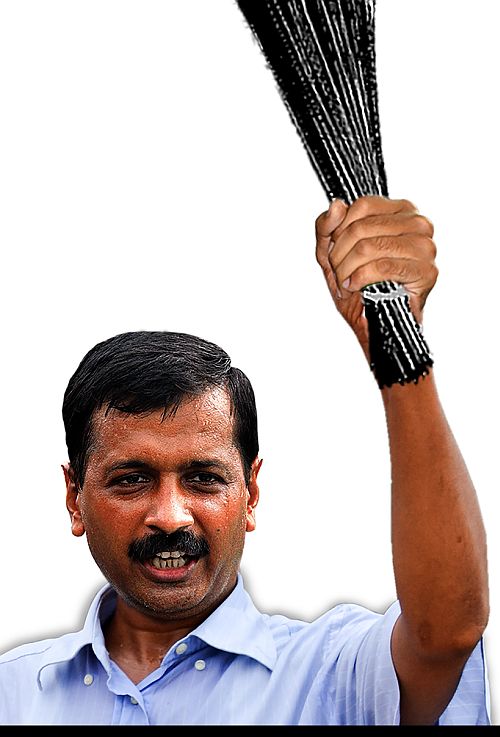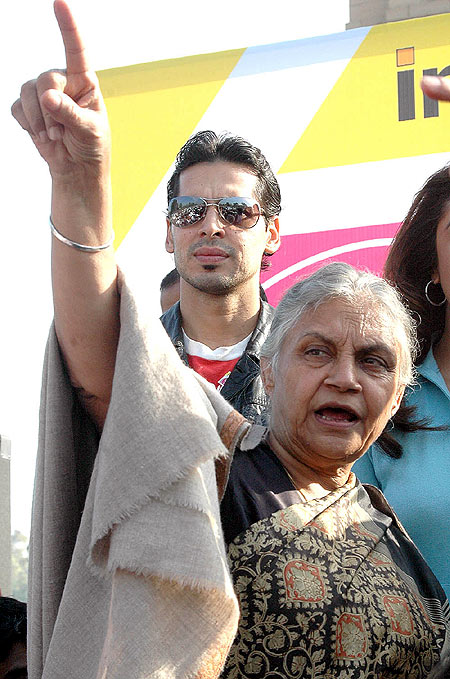Psephologists are 'scientific people' who have 'limited touch with reality', Delhi Chief Minister Sheila Dikshit tells Kavita Chowdhury of the dire predictions ahead of the assembly elections
Pollsters predict that Delhi Chief Minister Sheila Dikshit's successful innings on the political pitch after a hat-trick at the hustings may be ending. But, the consummate politician that she is, Dikshit herself betrays no signs of nerves when I catch up with her for a cup of tea at her Motilal Nehru Marg residence where she's taking a break before resuming her campaign.
With just days to go for the assembly polls, Dikshit's schedule is, naturally, fuller than usual. After all, she has 70 constituencies to cover, addressing rallies and jansabhas (people's meetings), sometimes answering the same questions over and over again with unstinting patience.
Our appointment has been set back about 10 minutes as the media-savvy Dikshit placates television reporters with a few bytes, gives a brief interview to a Hindi news channel all the while exhorting the Congress workers surrounding her to step up their last-minute campaigning.
Poll surveys, psephologists' predictions, hung Assembly, I say as a kind of preliminary to the conversation. She dismisses the first two as the remit of "scientific people" who have "limited touch with ground reality".
....
'Our promise for the future is in our slogan Rukegi Nahi Meri Dilli'
As for a hung assembly, she dismisses that decisively too. Her confidence stems from the "responses" she gets from the public every day -- "I meet as many as 2,000 people." Still, I persist, of the five states going to the polls, Delhi's electoral outcome is, unlike in previous terms, the most uncertain even though it is a Congress bastion. Surely anti-incumbency is natural after 15 years in power?
"There is always uncertainty till the results come out," she counters, "but we are confident of the work that we have done and our promises for the future is in our slogan Rukegi nahi meri Dilli [Our Delhi will not stop growing]. We are confident of winning."
This confidence stems from? "In our first election I was considered an outsider; we got 54 seats; the second time no one thought another term was possible - and we got 48 seats; the third time no one gave us a chance, and we got 43 seats. So every time, the Cassandras have predicted one thing, something else has come out."
Tea is served, but Dikshit doesn't take any. That's because she is not a "tea person" and sticks to a strict daily quota of two cups of "good old strong filter coffee with a dash of milk". Incredibly, given the well-known stimulant qualities of caffeine, she says she sometimes drinks a cup before bedtime. This and a 12- to 15-hour day do not appear to deter her from a daily regimen of a brisk morning walk of 25 to 30 minutes.
Not bad at 75 years but Dikshit says it's not a strain.
...
'Tell me, where is there no corruption?'
"I don't feel any tiredness because I enjoy my work. The day you feel I've become old and doddery and cannot think, that's when I should quit. But I don't feel like that now, God has been kind…" she trails off and then adds, "I can't say about tomorrow."
The only "regrets" she concedes were moments when she was "unduly targeted over corruption". "When you go on targeting somebody like that, when you target any government without any basis whatsoever, there are painful moments in politics." She is referring, of course, to the preponderance of brickbats rather than bouquets the Delhi government received for the string of scams that dogged the 2010 Commonwealth Games. Dikshit is unwilling to admit any guilt on this account, warning her political detractors, "Tell me, where is there no corruption? Those in glass houses should not throw stones at others."
I broach another controversial topic for her government, power reforms. The Aam Aadmi Party (AAP) and the Bharatiya Janata Party (BJP) have heaped accusations on her and her government of cosying up to private distribution companies (discoms), turning a blind eye to the rise in power tariffs.
Should she come back to power, would she revisit the issue since it resonates with the public? Dikshit parries right back, "No, not at all." The electricity tariff is decided by state electricity regulator after extensive consultation with stakeholders and the public, she asserts, and her government "has no role to play in it".
"Ask [Arvind] Kejriwal [the AAP leader and her challenger in the New Delhi constituency] what the tariff in Ghaziabad is. Ask the BJP what the power situation was like in Delhi when they were in power -- we had up to eight hours of power cuts." As a "sensitive" government, she informs me, what they do instead is to subsidise power "from their own coffers" for those who need it.
...
'AAP, BJP making capital out of people's lack of knowledge'
Scoffing at the claims of the AAP and BJP that they will bring down power tariffs by 50 and 30 per cent, respectively, if they were to form the government, Dikshit quipped, "They'll give 30 per cent less power!" She accuses these parties of "making capital out of people's lack of knowledge".
The "regularisation of unauthorised colonies" in the city is a practice that political parties have resorted to routinely to boost their vote banks, and the Congress has been no different. Dikshit rebuts this. "We did it for practical reasons, to give legality to something you cannot remove. Can you remove 40,00,000 people?" Dikshit instead holds other authorities (who are not under her administration) responsible for it. "The Municipal Corporation of Delhi and the police allowed it in the first place."
I remind her of Lokayukta Justice Manmohan Sarin's indictment of her government for using this as a poll sop the last time around. Dikshit unequivocally responds, "It was motivated. His judgment went through the home ministry and then to the President of India and it was rejected." She says regularisation was carried out over five years and she "wishes" she could have done more for the residents there.
Reeling off the statistics that she allots in her budget for the social sector (65 per cent), Dikshit proudly states, "I am my own finance minister" (true enough, she has handled the portfolio for the past three years). "We've managed to post a growth rate of 10.33 per cent. I have tried to make growth as equitable as possible."
...
'I acknowledge there is a sense of resentment in the public'
Despite the "visible" infrastructure development of which Delhi can boast, I bring up the tremendous public discontent with law and order and the fact that the city is infamous as the country's crime capital.
Dikshit pauses a moment before responding. "I acknowledge there is a sense of resentment in the public," she says, then adds, "On women's safety I did whatever I could do." She enumerates the steps her administration has taken -- the introduction of the 181 helpline number to attend calls on stalking, teasing and harassment.
"Soon we will have 24x7 vans for this 181 service that will attend to distress calls," she says but admits that women's safety is part of her "unfinished agenda".
And what about the AAP, which is tipped to be a significant vote splitter? Dikshit says she had once described them as a "phenomenon"; now "even Anna Hazare is questioning their probity". Ergo, no post-poll alliance is possible.
Despite her readiness to answer questions on her performance, she refuses to take questions on her political future and a possible role at the Centre given her proximity to the Gandhi family and the clout she wields within the Congress party. "Right now it's only December 8 on my agenda". That's the day the results will be announced.
Does the MP (she represented Kannauj in 1984) turned three-time chief minister have a life outside politics? Reading when she has the time, she says, attending cultural programmes and exhibitions, meeting friends. "I am, after all, a mother, a grandmother and a housewife."
As her personal secretary walks in signalling that my time's up, Dikshit smiles benignly and leaves even as I shoot my last query about former Union minister and Congress leader Ajay Maken being rumoured to be her successor should the Congress bag a fourth term. Should the Cassandras be believed this time?







article